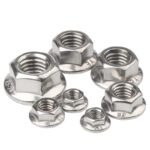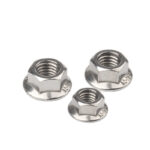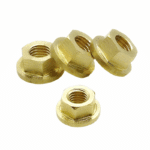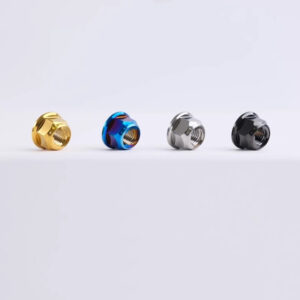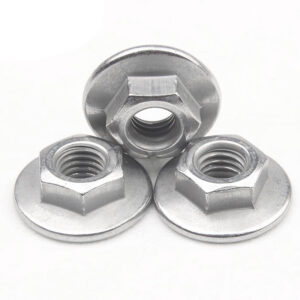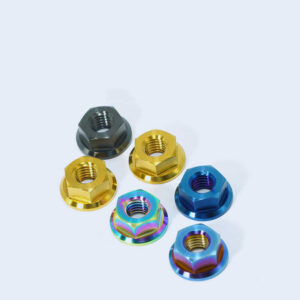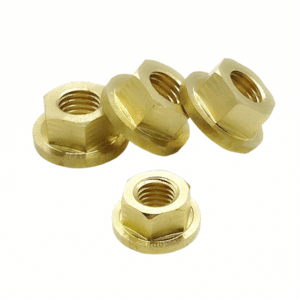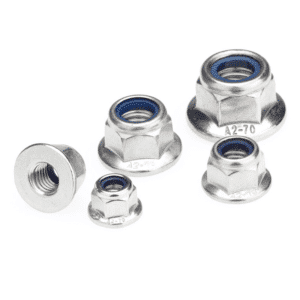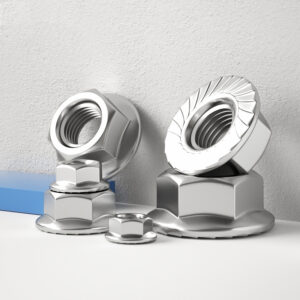- +86 18015401692
- sales@fastenmetal.com
Trusted by Over 1000 Customers All Over the World
Flange Nuts
Flange nuts are also called washer nuts. Different from common nuts, flange nuts are integrated with a washer and nut, and have anti-slip teeth on one end. FastenMetal is one of the best flange nuts manufacturers In China,we provide a wide range of different types and sizes high strength washer nuts. We also produce special nuts according to customer drawings.
- 2 Self-owned Factories
- ISO 9001:2015 certificated
- Hundreds of Suppliers




Gallery of Flange Nuts
-
Titanium Flange Wheel Lock Nuts
Add to cartTitanium Flange Wheel Lock Nuts are high-strength, lightweight nuts used to secure wheels on vehicles. Made from durable titanium, they resist rust and corrosion, making them ideal for performance cars and bikes. The built-in flange distributes pressure evenly, while the lock design helps prevent loosening during use. These nuts are popular in motorsports due to their strength, reliability, and weight-saving benefits.Material: Titanium
Standard:GB
Finish: Color plated
Size:M5-M16
Strength Grade:Grade8.8,10.9.12.8
Deprecated: preg_replace(): Passing null to parameter #3 ($subject) of type array|string is deprecated in /home/u101520528/domains/fastenmetal.com/public_html/wp-includes/kses.php on line 1807
-
Washer Nuts with Large Flange
Add to cartWasher nuts with a large flange are special fasteners that combine the features of a nut and a washer. The large flange increases the surface area for load distribution, which helps prevent damage to the material being fastened and reduces the risk of loosening. They’re often used in applications requiring extra support, such as in wood or soft materials.Bespoke nuts can be manufactured to order in non-standard sizes and specialist material grades – minimum order quantities apply.
Material: Stainless Steel
Standard:DIN
Finish: As finished
Size:M3-M20
Strength Grade:Grade8.8,10.9.12.8
Deprecated: preg_replace(): Passing null to parameter #3 ($subject) of type array|string is deprecated in /home/u101520528/domains/fastenmetal.com/public_html/wp-includes/kses.php on line 1807
-
Titanium Lock Nuts
Add to cartTitanium lock nuts are flange nuts made from titanium that feature a locking mechanism to prevent loosening due to vibrations or dynamic loads.Titanium is a high-strength, high-hardness material, so machining titanium flange nuts is more difficult than machining stainless steel flange nuts.Bespoke parts can be manufactured to order in non-standard sizes and specialist material grades – minimum order quantities apply.
Material: titanium
Standard:DIN
Finish: anodizing
Size:M4-M24
MOQ:300pcs
Deprecated: preg_replace(): Passing null to parameter #3 ($subject) of type array|string is deprecated in /home/u101520528/domains/fastenmetal.com/public_html/wp-includes/kses.php on line 1807
-
Brass Lock Nuts Washer Nuts
Add to cartBrass flanged nuts are fasteners made from brass, featuring a built-in flange that provides additional stability and load distribution. The flange helps prevent damage to connected surfaces and ensures a secure fit when paired with bolts or screws. Known for their corrosion resistance and aesthetic appeal, these nuts are commonly used in electrical, plumbing, and general engineering applications.
Material: Stainless Steel
Standard:DIN
Finish: As finished
Size:M3-M12
MOQ:1000pcs
Deprecated: preg_replace(): Passing null to parameter #3 ($subject) of type array|string is deprecated in /home/u101520528/domains/fastenmetal.com/public_html/wp-includes/kses.php on line 1807
-
Hex Blacken Flanged Nuts for Mould Clamp
Add to cartA mold clamp flanged nut is a type of fastener used to secure and connect mold components. It typically features internal threads and is used in conjunction with bolts or rods to provide fastening and connection. Mold clamp nuts play an important role in mold manufacturing and maintenance, ensuring that various parts of the mold are securely connected, which in turn guarantees the normal operation of the mold and the quality of the products.
Material: Stainless Steel,Carbon Steel
Standard:DIN
Finish: As finished
Size:M8-M24
Strength Grade:Grade8.8,10.9.12.8
MOQ:1000pcs
Deprecated: preg_replace(): Passing null to parameter #3 ($subject) of type array|string is deprecated in /home/u101520528/domains/fastenmetal.com/public_html/wp-includes/kses.php on line 1807
-
Hex Flange Nylon Insert Lock Nut
Add to cartA flange nylon insert lock nut is a type of nut that features a built-in serrated washer for added stability and a nylon insert that provides resistance against loosening due to vibration. The flange helps distribute the load, while the nylon insert grips the threads of the bolt, ensuring a secure fit.Material: Stainless Steel
Standard:DIN
Finish: As finished
Size:M3-M20
Strength Grade:Grade8.8,10.9.12.8
MOQ:1000pcs
Deprecated: preg_replace(): Passing null to parameter #3 ($subject) of type array|string is deprecated in /home/u101520528/domains/fastenmetal.com/public_html/wp-includes/kses.php on line 1807
-
Stainless Steel Hex Flange Nuts Washer Nuts
Add to cartFlange nuts also known as locking nuts, washer nuts, that features a wide serrated flange on one end. This flange acts like a washer, distributing the load over a larger surface area when the nut is tightened. Flange nuts have a locking function, with serrated angled designs that prevent the nut from rotating in the direction of loosening. This design helps to prevent the nut from vibrating loose, thereby maintaining its holding power.
Material: Stainless Steel
Standard:DIN
Finish: As finished
Size:M3-M20
Strength Grade:Grade8.8,10.9.12.8
Deprecated: preg_replace(): Passing null to parameter #3 ($subject) of type array|string is deprecated in /home/u101520528/domains/fastenmetal.com/public_html/wp-includes/kses.php on line 1807
Still not finding what you’re looking for? For fasteners that are unavailable as standard products, or for very specific requirements, we can manufacture custom fasteners and fixings exactly to your specifications or drawings.
About Flange Nuts
What is Flange Nuts?
Flange nuts also known as locking nuts, washer nuts, that features a wide serrated flange on one end. This flange acts like a washer, distributing the load over a larger surface area when the nut is tightened. Flange nuts have a locking function, with serrated angled designs that prevent the nut from rotating in the direction of loosening. This design helps to prevent the nut from vibrating loose, thereby maintaining its holding power.
What is the difference between flange nuts and regular nuts?
The main differences between flange nuts and regular nuts are their appearance,material, application, and Installation Methods.
- Appearance
Ordinary nuts typically consist of a cylindrical threaded rod and two hexagonal nut heads. Flange nuts, on the other hand, often include a flat, circular metal plate with a threaded hole sandwiched between two nut heads. The structure of flange nuts provides better anti-vibration performance, making them widely used in machinery and equipment.
- Material Differences
Ordinary nuts are usually made of materials such as low-carbon steel, medium-carbon steel, or stainless steel. Flange nuts, however, are often made from high-strength alloy materials like forged stainless steel, bright stainless steel, or carbon structural steel, which enhances their load-bearing capacity and lifespan.
- Different Uses
Ordinary nuts are used to connect threaded rods and parts, while flange nuts are primarily used to connect flanges with pipes, containers, and other components. The stable structure of flange nuts allows them to bear significant pressure and vibration loads, making them suitable for high-strength connections in machinery and piping systems.
- Different Installation Methods
Ordinary nuts can be installed simply by tightening them with a wrench or a torque wrench. Flange nuts, however, must be installed onto a flange, with the two nut heads secured on both ends of the flange. They are then mounted onto pipes or containers, and tightened using bolts to form a sealing effect.
In conclusion, while both ordinary nuts and flange nuts are important threaded components used for connecting and securing parts, they differ significantly in terms of structure, materials, and applications. Choosing the appropriate type of nut can greatly enhance system performance and quality, ensuring long-term reliable operation of equipment.
Flange Nuts vs Lock Nuts, which one is better?
Flange nuts and lock nuts have their own advantages and suitable applications, so it’s difficult to say which one is better. Here are some of their features and applicable situations:
Flange Nuts:
- Advantages: Flange nuts usually have a larger contact surface and higher connection strength, making them suitable for situations where high pressure and vibration need to be withstood. Additionally, flange nuts are relatively easy to install and remove, allowing for quick maintenance and replacement of pipes.
- Applications: Flange nuts are commonly used to connect pipes, flange fittings, valves, and other equipment, especially in industrial applications that involve high pressure, high temperature, or corrosive environments.
Lock Nuts:
- Advantages: Lock nuts have a self-locking function that prevents the nut from loosening, which increases the reliability and safety of the connection. These nuts are suitable for situations where long-term connection stability is needed, such as in automobiles and mechanical equipment.
- Applications: Lock nuts are widely used in the automotive, aerospace, electronics, and mechanical industries, particularly in environments where vibration, impact, or temperature changes are present.
Therefore, the choice between flange nuts and lock nuts depends on the specific application requirements. Flange nuts are ideal for situations requiring high pressure and vibration resistance, where stability and reliability are crucial, while lock nuts are better suited for preventing loosening and maintaining connection stability. It’s best to consult a professional or supplier before making a decision to ensure you’re choosing the most appropriate type of nut for your application.

